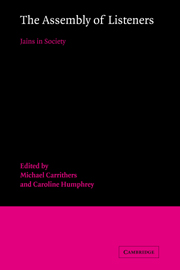Book contents
- Frontmatter
- Contents
- List of illustrations
- List of contributors
- Acknowledgements
- Map: South Asia
- Introduction
- 1 Jains as a community: a position paper
- 1 JAIN IDEALS AND JAIN IDENTITY
- 2 Jain ideals and Jain identity
- 3 Somadeva Suri and the question of Jain identity
- 4 The role of the layman according to the Jain canon
- 5 Women and the reproduction of the Jain community
- 2 LOCAL JAIN COMMUNITIES
- 3 JAINS IN THE INDIAN WORLD
- 4 NEW JAIN INSTITUTIONS IN INDIA AND BEYOND
- Conclusion
- Glossary and pronunciation
- Select bibliography
- Index
3 - Somadeva Suri and the question of Jain identity
Published online by Cambridge University Press: 07 October 2011
- Frontmatter
- Contents
- List of illustrations
- List of contributors
- Acknowledgements
- Map: South Asia
- Introduction
- 1 Jains as a community: a position paper
- 1 JAIN IDEALS AND JAIN IDENTITY
- 2 Jain ideals and Jain identity
- 3 Somadeva Suri and the question of Jain identity
- 4 The role of the layman according to the Jain canon
- 5 Women and the reproduction of the Jain community
- 2 LOCAL JAIN COMMUNITIES
- 3 JAINS IN THE INDIAN WORLD
- 4 NEW JAIN INSTITUTIONS IN INDIA AND BEYOND
- Conclusion
- Glossary and pronunciation
- Select bibliography
- Index
Summary
Somadeva Suri, a south Indian Jain monk of the tenth century AD, was the author of a work called the Upāsakādhyayana. It is a central text of Digambara śrāvakācāra literature. The aim of this literature is to lay down ideals, norms, and rules of proper conduct for śrāvakas, Jain lay followers. There is a large corpus of śrāvakācāra literature among both the Digambaras and the Svetambaras, the two major sects into which Jains are divided. The śrāvakācāra literature as a genre begins only in medieval times, though it has ancient roots. It continues down to modern times, much of the modern writing being in the vernacular.
Somadeva Suri's Upāsakādhyayana – literally, ‘the chapter on upāsakas’ that is, lay followers – is one of the earliest texts of the śrāvakācāra genre. Its influence on all subsequent texts of its kind is deep. It is a crucial text, I think, in trying to understand how medieval Jains articulated their own identity in relation to Jain ideals and to the larger society around them. What I have to say here will be based mainly on this text.
The Upāsakādhyayana is the last part of a much larger work, an epilogue to a religious novel called the Yaśastilakacampū which uses prose and verse with equal artistic care.
- Type
- Chapter
- Information
- The Assembly of ListenersJains in Society, pp. 19 - 30Publisher: Cambridge University PressPrint publication year: 1991
- 2
- Cited by



